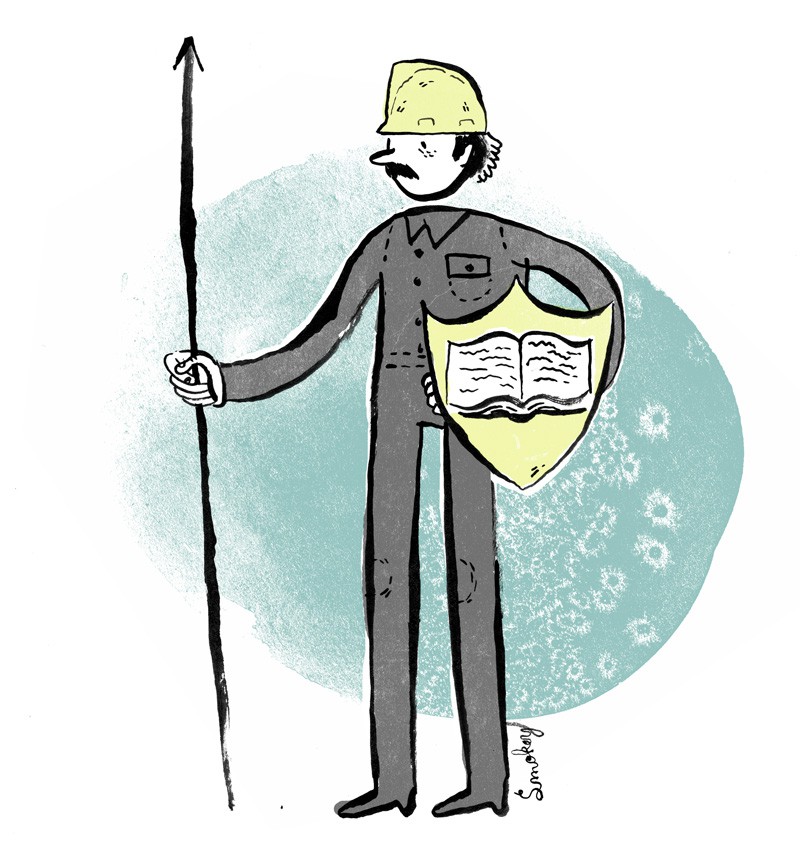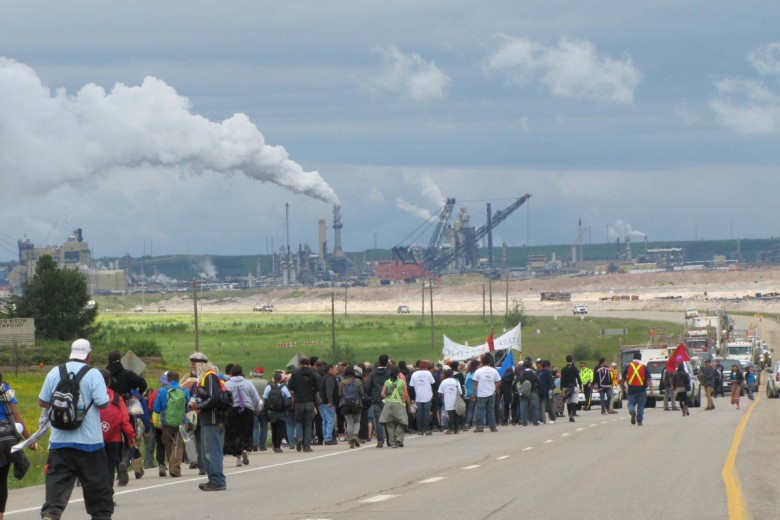
The labour movement has been on the defensive across the country in recent months with a lockout and back-to-work legislation at Canada Post, a protracted dispute between Air Canada and the Canadian Union of Public Employees, and continued attacks on collective bargaining rights by the federal government. In Saskatchewan, legislation passed by the Wall government has limited workers’ rights to organize and form unions, to bargain collectively and to strike.
The position of labour has, in many respects, never been weaker. At a time of extreme political polarization in the country, particularly in Saskatchewan where a recent economic boom for some has left others homeless and otherwise struggling to make ends meet, right-wing governments and conservative media are succeeding in playing the average worker against the union worker, who is typically portrayed as cash grabbing and lazy. Increasingly, the public, including many low-income and middle-class people, is voting for parties that promise smaller government and tax savings, supposedly leaving more money in their pockets for the things they need most.
This narrative has inspired surprisingly little dissent, and has proven successful in persuading voters. Many have lost sight of the fact that lower taxes mean fewer public services, lower wages and benefits for public-sector workers (which in turn lowers the bar for the private sector), and little regulation of environmental protections or health and safety. In the face of this kind of apathy and misinformation, a campaign that inspires people to re-engage politically through a combination of information, action and close-to-home narratives has the potential to help shake things up.
The Saskatchewan Federation of Labour (SFL) Labour Issues campaign is a broad and comprehensive project based on popular education and community mobilization around issues facing the people of Saskatchewan, including workers’ rights, health care, education, public services, environment and other issues. While the campaign is intended, in part, to frame the debate in the upcoming Saskatchewan provincial election, its purpose is also to empower people to become political agents beyond election time. Whereas the traditional role of the labour movement in provincial election campaigns has focused on supporting the New Democratic Party (NDP), the Labour Issues campaign aims to forge a new way for labour to engage in politics and influence public opinion beyond political endorsement.
The first incarnation of the Labour Issues campaign began in the lead up to the 2003 provincial election. Organizers polled union households to identify the issues of most concern to workers, and ran ad campaigns to stimulate discussion of those issues. Many credit the impact of the campaign for the NDP’s surprise victory in an election where no one expected them to retain power.
The campaign was particularly effective at changing the terms of the debate on Crown corporations and putting the right-wing Saskatchewan Party on the defensive, forcing them to deny that they would sell off provincially owned utilities if elected. A similar approach was adopted by the SFL for the 2007 election. That year, however, Brad Wall’s Saskatchewan Party was elected, which soon had disastrous consequences for workers.
In 2010 the SFL opted to expand the campaign beyond election time, with ongoing popular education and political engagement with workers and community members across the province. It began in early 2010 with the publication of a booklet titled Labour Rights are Human Rights, which includes information about the regressive Bills 5 and 6 and other provincial government attacks on workers. Mobilizers within the labour movement and the broader progressive community were asked to organize presentations in their communities, workplaces and union locals about the issue. Booklets about health care, education, public services and more issues were soon developed, and mobilizers were again trained on these topics.
Speaking about the most recent incarnation of the campaign, Cara Banks, executive assistant at the Saskatchewan Federation of Labour, said, “After 22 months of talking with workers, this campaign has had a significant impact. We’ve also invited community activists to the trainings, and have expanded our organizing so we are not just talking to unionized people.”
Rhonda Derby is one of the union activists who has participated in the Labour Issues training. She worries that the campaign may not reach enough people since she often sees the same dedicated few at training sessions. That’s why Derby has stacks of booklets in her car that she drops off at doctors’ offices, bulletin boards and elsewhere in the community. “There are a few people who don’t think that they are affected by the cuts, but once it is explained how it relates to them, it’s like a light bulb moment and just about everyone is a little pissed off,” Derby noted. She has also been successful getting co-workers involved in election campaigns after receiving the information. “Some worked phones or did flyer drops, and a couple of people went knocking on doors. Most importantly, they engaged others in conversations about the political climate we are in.”
Although those behind the Labour Issues campaign would ideally like to develop a broader vision and outline the kind of Saskatchewan they would like to see, they have found that a more defensive approach is necessary given the scale of the attack the Wall government is waging on workers. Larry Kowalchuk, one of the campaign organizers and trainers, says, “Just letting people know what this government is doing is an immense task. The accountability is just not there in the media and in the general public. This government is tearing the heart out of Saskatchewan.”
Mobilizers in the Labour Issues campaign and the SFL political strategy committee, the body behind the campaign, have worked very hard. They have produced and distributed over 200,000 booklets and done hundreds of presentations in all parts of the province. The unique training sessions, grounded in popular education techniques that draw on participants’ stories and experiences before presenting new information, give the mobilizers effective tools to engage people in their presentations. Community activist Emily Eaton says, “I thought that the training sessions were really interesting in that they tried to focus not just on the issues themselves, but on how to talk to people, what might grab their attention, what the potential pitfalls are, and where are you going to encounter resistance.”
There are differing opinions within the Saskatchewan labour movement about whether it is more effective for unions to work independently in politics or to be directly affiliated with political parties. These tensions may grow in the coming months as Brad Wall’s Saskatchewan Party is poised for re-election on November 7, likely with an even stronger majority. While in the past many unions would have tried to oust such an unfriendly government by encouraging their members to support the NDP, the Labour Issues campaign instead educates and engages people about the political process, with the aim of fostering personal agency and community power.
The Labour Issues campaign will not end with the provincial election. If the Saskatchewan Party is in fact given a stronger mandate, the organizers in the campaign will have their work cut out for them. Advocates for the Labour Issues campaign approach argue that the most significant part of the campaign is not in the details of the issues or even in the electoral result, but in engaging and mobilizing people across the province at a grassroots level. “I don’t see the issues themselves as being as important as the analysis of how power operates, and how we can effectively challenge it,” Eaton noted. “The Labour Issues campaign is broadening the base of people who can speak confidently about these issues, organize their communities, and ultimately make demands on government – regardless of which party happens to be in power.”






